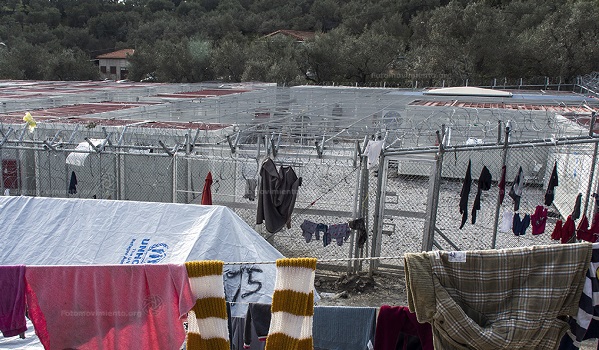Two inhabitants of the Moria camp in Lesbos were injured by gun-shots allegedly after openly attempting to break the quarantine imposed on its residents. A fire caused by unrest following the death of a woman in the Vial refugee camp on Chios island cost severe damage. A pregnant woman tested positive for the Corona virus in a mainland hostel now facing a serious outbreak. On April 16 the European Court of Human Rights (ECtHR) ordered immediate transfer of several vulnerable people out of Moria where residents face acute health risks.
In the beginning of the week, hundreds of residents from the Moria camp on Lesbos protested to demand transfers to the mainland in fear of exposure to the Corona virus due to the overcrowded and unsanitary conditions in the camp. On April 22 following the unrest gun-shots were fired into the camp wounding two people with the assailant or assailants evading capture. Reportedly the two were shot after openly attempting to break the quarantine imposed on the residents of camp.
A woman from the Vial refugee camp on Chios island was returned from hospital after testing negative for the Corona virus later died of causes that are still being investigated. Her death caused severe protests in the camp and fire breaking out during the unrest. Greek migration ministry secretary, Manos Logothetis stated that: “A large part of the camp’s administrative services was destroyed”.
After a positive Corona test of a pregnant woman in a hostel in Kranidi South of Athens used as a refugee shelter, another 150 out of the 497 people living or working in the facility run by International Organization for Migration (IOM) tested positive. The hostel that has been quarantined since April 16, is the third facility hosting migrants in Greece to face an outbreak.
the European Court of Human Rights ordered interim measures under Rule 39 in the case of E.I. and others v. Greece to ensure the immediate transfer of several people out of Moria. Refugee Support Aegean (RSA), which represented the applicants, commented: “many more people face acute health risks, not least due to particular circumstances including age, medical conditions and trauma. Immediate transfer of those individuals, regardless of status, to appropriate accommodation is necessary for Greece to comply with its human rights obligations”. The organisation further quotes an announcement by the Ministry of Migration of the transfer to the mainland of vulnerable asylum seekers, including elderly people and people suffering from chronic medical conditions.
The European Commission has yet to release its report on the controversial suspension of Greek asylum procedures in between 1 and 31 March, a measure that has been widely critisised for being illegal but was ratified by the Greek parliament on March 26. The suspension was followed by a freeze of asylum applications due to the COVID-19 crisis and, on 10 April, followed by a bill amending the restrictive measures introduced in October 2019 in the International Protection Act. In its analysis of the bill RSA points to several concerns including extending competence for asylum registration to reception facilities, the introduction of a “merits test” depriving the majority of appellants of the right to legal assistance, and the possibility for authorities to forgo interviews when interpretation services are not available in the language of the applicant”. Particularly, the introduction of detention in a pre-removal centre upon rejection of the appeal “amounts to a flagrant violation of Greece’s duty to resort to detention only as a last resort and the right to an effective remedy”.
As part of general funding package of €3 billion to support the EU healthcare sector, Greece will receive €350 million Euro to deal with increased migratory pressures.
For further information:
- ECRE, Greece: 1000 Vulnerable People Evacuated, Relocation of Children Started, Asylum Procedures Suspended, Renewed Tensions at Turkish Border, April 2020
- ECRE, Greece: Still no Access to Asylum, Second Camp Quarantined, First Relocations Ahead, Push Backs to Turkey, April 2020
- ECRE, Greece: Parliament Ratifies Emergency Decree Amid Intensifying Critique, March 2020
- ECRE, Greece: Fire and Virus Fear in Moria, 450 People Detained on Vessel Moved to Closed Camp, March 2020
- ECRE, Violations Continue in Greece, EU Says Asylum Procedures Cannot be Suspended, March 2020
- Organisations in Greece, Joint Statement: “Protect our laws and humanity!”, March 2020
- ECRE, Weekly Editorial: EU is Crossing the Red Line by Preventing Refugees from Crossing its Borders, March 2020
- ECRE, Greece: Situation in Lesvos Intensifies after Police Crackdown on Protesters, February 2020
- ECRE, Greece: Nationality-based Detention in the Moria Refugee Camp, January 2020
- ECRE, Serbia Shows European Solidarity in Greece – France Follows up on Mixed Promises, January 2019
- ECRE, Greece: Government Hit with Interim Measures and Introducing New List of Safe Country of Origin, January 2020
- AIDA, Country Report Greece, 2019 Update
- ECRE, France to Assist Greece Where Situation Continues to Worsen, December 2019
- ECRE, Greece: Six People Found Dead in Evros Region while Authorities Prop Up Border Security, December 2019
Photo: (CC) Fotomovimiento, January 2018
This article appeared in the ECRE Weekly Bulletin . You can subscribe to the Weekly Bulletin here.

